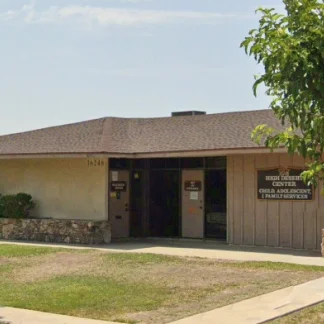Revival Recovery Services
Revival Recovery Services is a private rehab located in Apple Valley, California...
Located in Victorville, California, High Desert Child, Adolescent, and Family Services provides outpatient treatment and intensive outpatient programs (IOP) for children, teens, adults, and families. They offer mental health treatment, dual diagnosis treatment, and alcohol and drug rehab services. They also provide care for pregnant women and mothers with young children.
The intensive outpatient program meets three days per week, for three hours at a time. Individual therapy, group therapy, family therapy, drug court services, and referral services are provided. This program is only available to individuals who need a higher level of support and structure than the traditional outpatient services can provide.
The outpatient program offers two 90-minute group sessions per month, along with at least one individual therapy session. Drug and alcohol testing takes place at least two times per month. Teens and adults are separated into groups to engage in age-specific treatment. This service also provides a perinatal program and treatment for pregnant women. Women with children up to the age of ten may attend. Day care is provided in most circumstances.
High Desert Child, Adolescent, and Family Services accepts most insurance plans, including Amerigroup, Magellan, ComPsych, Cigna, Blue Cross Blue Shield, TRICARE, and Wellmark. Out of network benefits may vary, so it’s important to verify coverage with your provider.
Contact us for more information: (760) 243-7151

Connect with High Desert Child Adolescent and Family by calling their admissions team directly.
(760) 243-7151 Website Get DirectionsThe Substance Abuse and Mental Health Services Administration (SAMHSA) is a branch of the U.S. Department of Health and Human Services. Established in 1992 by congress, SAMHSA's mission is to reduce the impact of substance abuse and mental illness on American's communities.
SAMHSA Listed: Yes
Whether a marriage or other committed relationship, an intimate partnership is one of the most important aspects of a person's life. Drug and alcohol addiction affects both members of a couple in deep and meaningful ways, as does rehab and recovery. Couples therapy and other couples-focused treatment programs are significant parts of exploring triggers of addiction, as well as learning how to build healthy patterns to support ongoing sobriety.
Research clearly demonstrates that recovery is far more successful and sustainable when loved ones like family members participate in rehab and substance abuse treatment. Genetic factors may be at play when it comes to drug and alcohol addiction, as well as mental health issues. Family dynamics often play a critical role in addiction triggers, and if properly educated, family members can be a strong source of support when it comes to rehabilitation.
Group therapy is any therapeutic work that happens in a group (not one-on-one). There are a number of different group therapy modalities, including support groups, experiential therapy, psycho-education, and more. Group therapy involves treatment as well as processing interaction between group members.
In individual therapy, a patient meets one-on-one with a trained psychologist or counselor. Therapy is a pivotal part of effective substance abuse treatment, as it often covers root causes of addiction, including challenges faced by the patient in their social, family, and work/school life.
Research clearly demonstrates that recovery is far more successful and sustainable when loved ones like family members participate in rehab and substance abuse treatment. Genetic factors may be at play when it comes to drug and alcohol addiction, as well as mental health issues. Family dynamics often play a critical role in addiction triggers, and if properly educated, family members can be a strong source of support when it comes to rehabilitation.
Group therapy is any therapeutic work that happens in a group (not one-on-one). There are a number of different group therapy modalities, including support groups, experiential therapy, psycho-education, and more. Group therapy involves treatment as well as processing interaction between group members.
In individual therapy, a patient meets one-on-one with a trained psychologist or counselor. Therapy is a pivotal part of effective substance abuse treatment, as it often covers root causes of addiction, including challenges faced by the patient in their social, family, and work/school life.
Group therapy is any therapeutic work that happens in a group (not one-on-one). There are a number of different group therapy modalities, including support groups, experiential therapy, psycho-education, and more. Group therapy involves treatment as well as processing interaction between group members.
In individual therapy, a patient meets one-on-one with a trained psychologist or counselor. Therapy is a pivotal part of effective substance abuse treatment, as it often covers root causes of addiction, including challenges faced by the patient in their social, family, and work/school life.
In individual therapy, a patient meets one-on-one with a trained psychologist or counselor. Therapy is a pivotal part of effective substance abuse treatment, as it often covers root causes of addiction, including challenges faced by the patient in their social, family, and work/school life.
Revival Recovery Services is a private rehab located in Apple Valley, California...
MHS - Helping Hands offers families the help and support they need to stay toget...
VA Loma Linda Healthcare System - Victorville Community Based Outpatient Clinic ...
Aegis Treatment Centers, located in Hesperia, California, is an alcohol and drug...